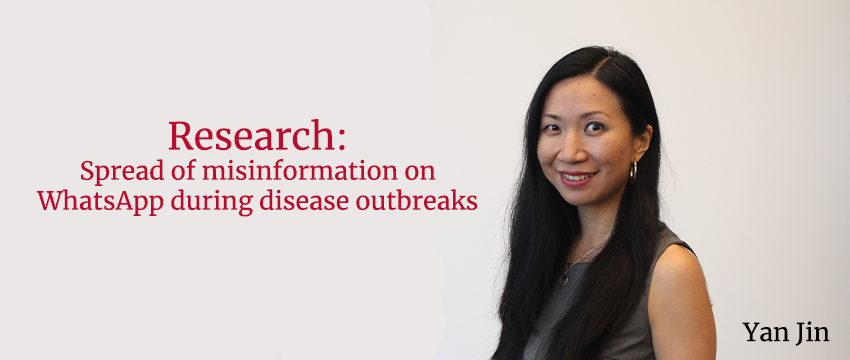Grady College’s Yan Jin selected by WhatsApp to research spread of misinformation

Grady College’s Yan Jin selected by WhatsApp to research spread of misinformation
WhatsApp, the Facebook-owned messaging platform, has selected a research team including Yan Jin, Georgia Athletic Association Professor in Grady College and assistant department head of advertising and public relations, to analyze how misinformation spreads and its impact on elderly during disease outbreaks.
WhatsApp selected 20 global research projects out of nearly 600 proposals and invested a total of $1 million to investigate how misinformation is spread and perceived.
Jin is part of a team of five researchers, two from the United Kingdom and two from India, who collectively were selected to research misinformation vulnerabilities among elderly during disease outbreak.
“Researchers want their work to create personal impact that helps individuals and communities,” Jin said. “Crisis communications must go beyond protecting the reputation of brands or organizations because public safety and well-being must be the top priority.”
Jin also serves as associate director of the Center for Health and Risk Communication, based at Grady College.
Jin is helping design the experimentation phase of the research with a focus on how different formats of information with varied accuracy level (accurate information vs. misinformation) affect people’s information trust, perceived source credibility and disease severity, and their intention to share such information on social media. The research team seeks to empower smartphone users to skillfully assess the accuracy of information on social media related to disease outbreak.
Based on real-world examples that circulated on WhatsApp during the 2018 Nipah Virus outbreak, the assessment method will use a variety of text elements, imagery and a combination of both to help determine if misinformation spreads more easily through a certain type of information delivery.

The survey will be administered to elderly adults and their children in Bangalore, India, an area that dealt with multiple disease outbreaks as recent as 2018.
“We are basing our language and graphics on content seen in this community earlier this year,” Jin said. “It is important to be culturally authentic so we can best understand how our participants assess the accuracy of information.”
Jin said her team’s goal is to gather knowledge about how people process misinformation and recommend accurate information dissemination strategies to present to WhatsApp. The results will then be shared with public health organizations to help officials more effectively inform citizens of health risks in their communities.
The research team consists of:
- Santosh Vijaykumar (principal investigator), Northumbria University (United Kingdom)
- Venkat Chilukuri, Srishti Institute of Art, Design and Technology (India)
- Yan Jin, University of Georgia, Grady College of Journalism and Mass Communication (United States)
- Arun Nair, Health Systems Research India Initiative (India)
- Claudia Pagliari, University of Edinburgh (United Kingdom)